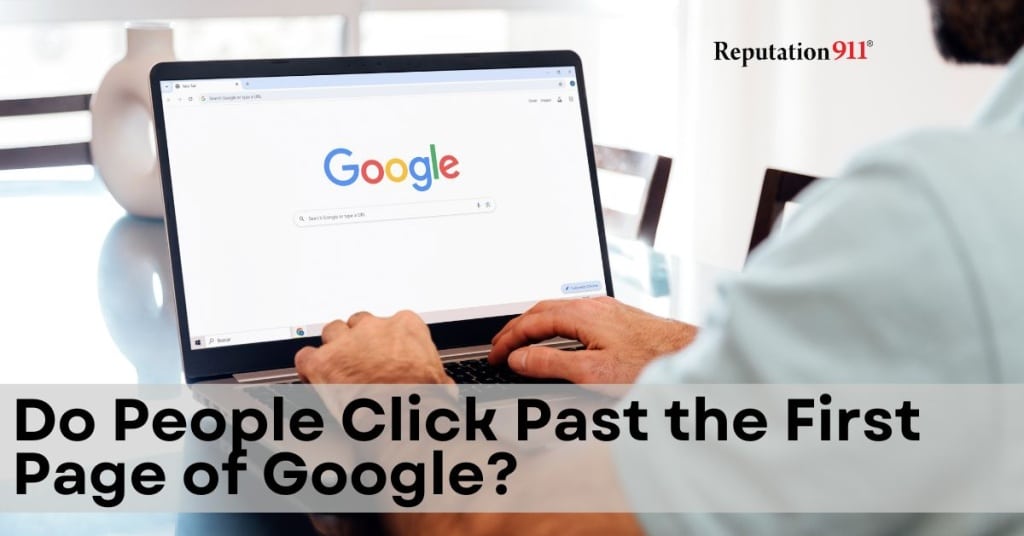
When people search your name or business on Google, they rarely click to the second page of search results. In fact, 91.5% of users never click past page one..
That means if your positive content is stuck on the second page of Google — or worse, if negative articles appear on page 1 — it can damage your reputation and cost you business.
But you’re not stuck there forever. With the right SEO steps, you can elevate your owned content from page 2 of Google to page 1, where it will be more visible to users.
This guide shows you how to move up in the rankings and repair your online reputation.
Page 2 of Google refers to the second page of search engine results pages (SERPs).
Google prioritizes serving relevant content in the search engine results, so when you search for something on Google, the results are ranked in order of relevance.
Since the most relevant results usually appear on the first page, users often find the answers they need without ever clicking to the second page of search results.
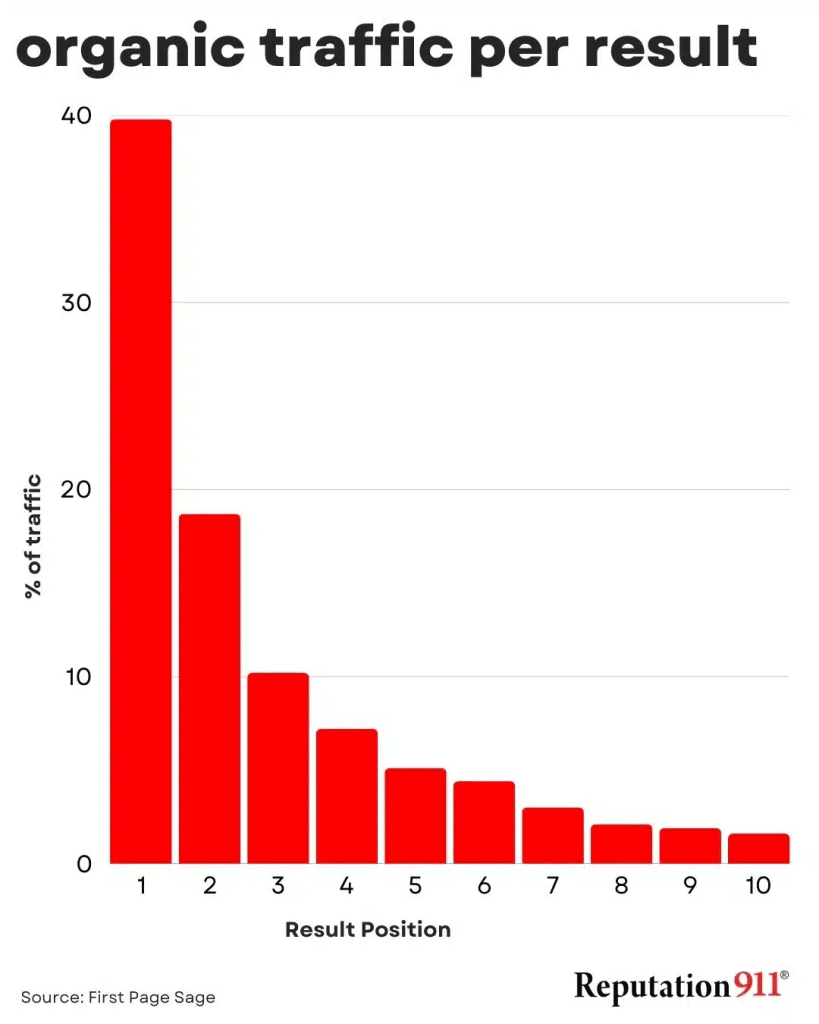
Most people never bother clicking past the first page of Google search results.
In fact, studies show that 91.5% of users stay on the first page, meaning only a small fraction ever make it to the second.
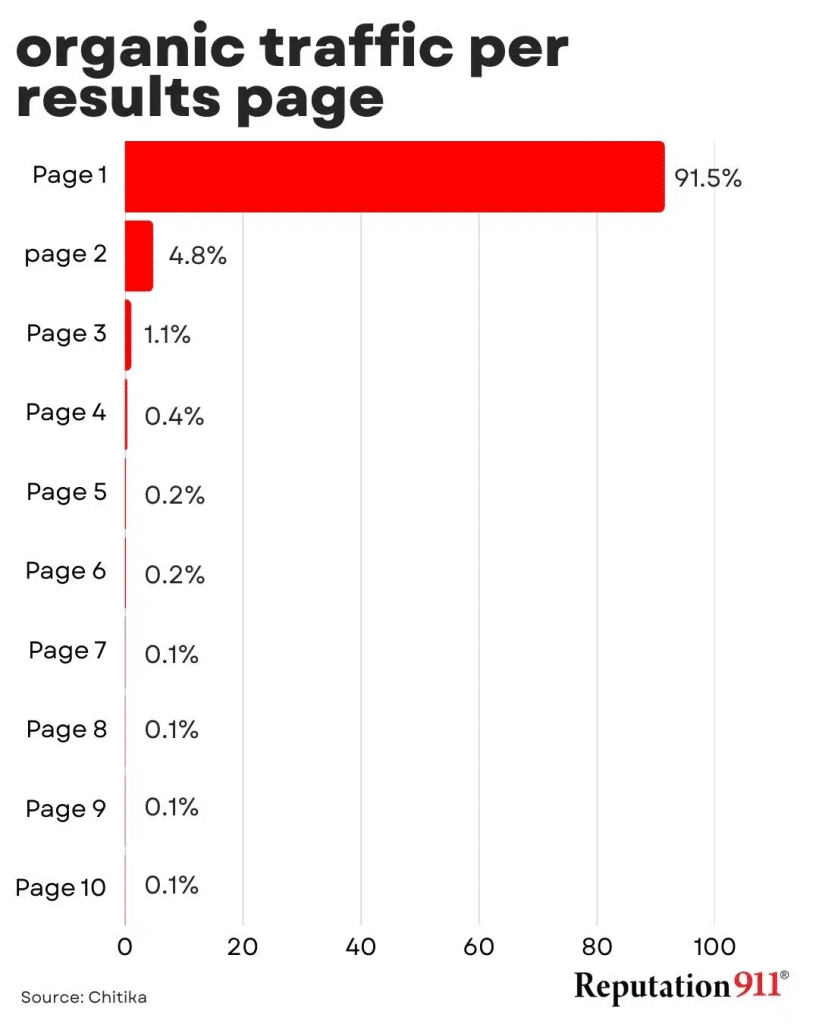
What’s shown on Google, particularly in the first page of search results, can greatly shape someone’s perception about you. But what about the second page?
Depending on the type of content about you, page 2 can either help or hurt your reputation.
If your positive content sits on the second page of Google, it’s almost invisible. That’s a lost chance to build trust, attract customers, and shape how people see you.
But, pushing negative content to page 2 is a win. Fewer people will ever find it, helping repair and protect your online reputation.
First impressions happen on page 1. Ranking there means:
That’s the core of search engine suppression–controlling what people find when they search for you.
Factor | Page 1 | Page 2 |
Average CTR | Up to 28.5% for Position 1 – Strong Overall SEO CTR | Less than 1% CTR |
Visibility | Extremely high–most users never look past page 1 | Nearly invisible to searchers |
Positive Content | Seen by users; builds trust and credibility | Missed opportunity of stuck on page 2 |
Negative Content | Hurts your reputation is visible on page 1 | Helps reputation if pushed to page 2 |
Ideal Outcome | Positive, owned content ranks here’ negative content pushed lower | Negative content suppressed here; positive content shouldn’t stay stuck |
If you want to get your positive content on page 1 of Google search, many pages end up stuck on the second page of Google because of a few common issues.
Here’s what could be holding your content back:
Rankings can shift often as Google updates its search results. Find out how often Google updates search results so you can plan your SEO efforts more effectively.
If your positive, owned content is stuck on the second page of Google, people can’t see it.
But, you can change that. With the right SEO tips, you can move your own pages to page 1–where they help build trust, attract customers, and protect your reputation.
Here’s how to rank higher and take control of what people find about you:
Your page needs clear signals to show Google what it’s about and why it should rank on page 1.
Start here:
Include your name, business, or brand in your title tags, H1 headings, and meta descriptions. For example:
Sprinkle in keywords connected to your brand or industry–things you want to be known for. These help Google understand the full context of your page.
Small changes to your on-page SEO can make a big difference in helping your positive, owned content move from the second page of Google to page 1.
Internal links help Google understand which pages on your website are most important. They also help pass authority from stronger pages to those stuck on the second page of Google.
Here’s how to do it:
Find pages on your site that already rank well or get good traffic. Add links from those pages to the ones you want to boost.
Instead of generic words like “click here,” use text that includes your target keywords. For example:
Strategic internal linking can help your positive, owned content move from the second page to page 1.
Backlinks are links from other websites that point to your pages. Google sees them as votes of confidence–and they’re one of the strongest signals for moving your content up in rankings.
Here’s how to get quality backlinks:
List your business or personal brand in reputable directories like:
Write articles for well-known blogs, news sites, or industry publications. In exchange, you typically receive a link back to your website.
Search for places online where your name or business is mentioned but not linked. Reach out and ask them to add a link to your site.
Here’s how to find and claim those mentions:
Turning unlinked mentions into backlinks is one of the easiest ways to build authority without creating new content.
If your content is stuck on the second page, it might just need an update. Google favors pages that are current, detailed, and useful.
Here’s how to improve your page:
Refreshing and expanding your pages can give your content a significant rankings boost.
Getting your page to rank on Google is only half the battle. You also need people to click on your result instead of someone else’s. That’s where improving your CTR comes in.
Here’s how to boost it:
Add special code to your web pages so Google can display extra details in search results, like FAQs, star ratings, or business information. Popular types include:
These rich results can make your listing stand out and attract more clicks.
Avoid generic titles like “Home” or “About Us.” Instead, create clear, engaging titles and meta descriptions that include your main keywords and show why people should visit your page.
Unique titles and descriptions help your pages stand out in search results and improve your click-through rate.
Write short, direct answers to common questions in your content. Google may pull this text into a featured snippet at the top of page 1, giving your content extra visibility.
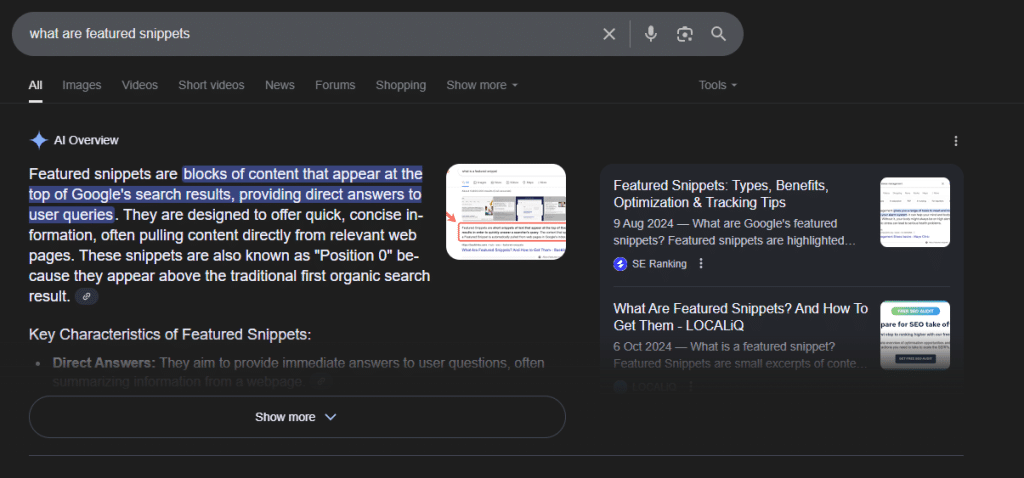
A higher CTR helps your positive, owned content perform better–and signals to Google that your page deserves a top spot, which will in turn increase your CTR by being more visible in search results.
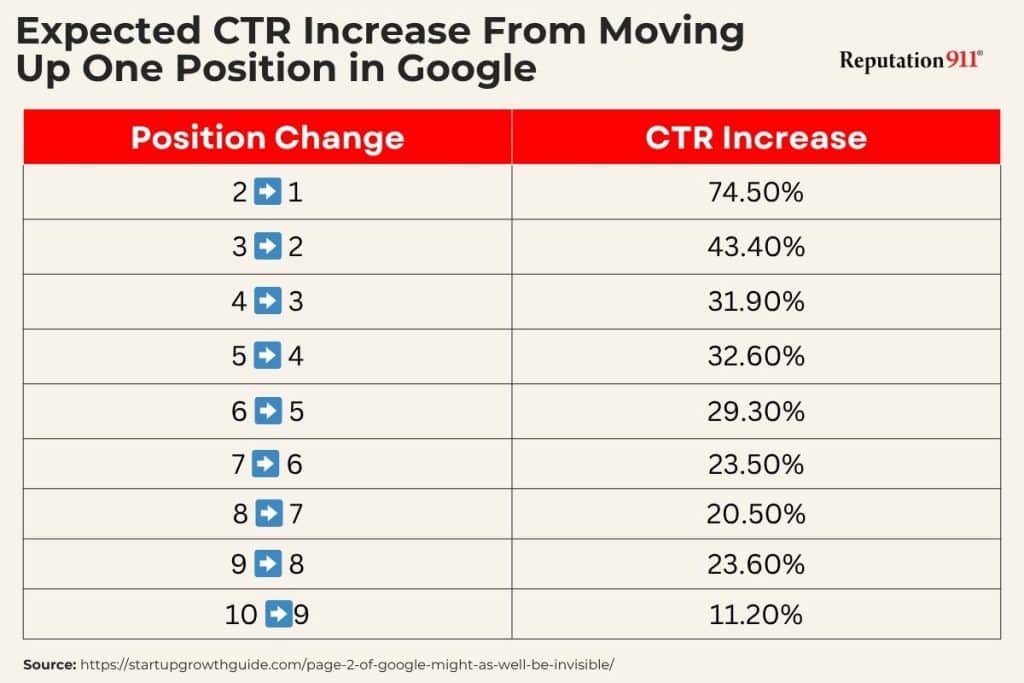
To learn more about optimizing for featured snippets, check out our guides:
Even great content can stay stuck on the second page of Google if your website has technical problems. Both search engines and users expect a fast, smooth, mobile-friendly experience.
Here’s what to do:
Most people search on their phones. Ensure your website appears visually appealing and functions properly across all screen sizes. Text should be easy to read, buttons should be easy to tap, and pages shouldn’t require horizontal scrolling.
Slow websites frustrate users, resulting in a higher bounce rate and lower search engine rankings. To improve speed:
Google prefers secure sites. Make sure your website uses HTTPS instead of HTTP. A secure connection builds trust with users and can significantly boost rankings.
Check your website for broken links. These frustrate users and signal to Google that you’re neglecting your website. Tools like Screaming Frog or other free online link checkers can help you find and fix them.
Fixing technical issues keeps visitors on your site longer, which signals to Google that your content is worth seeing.
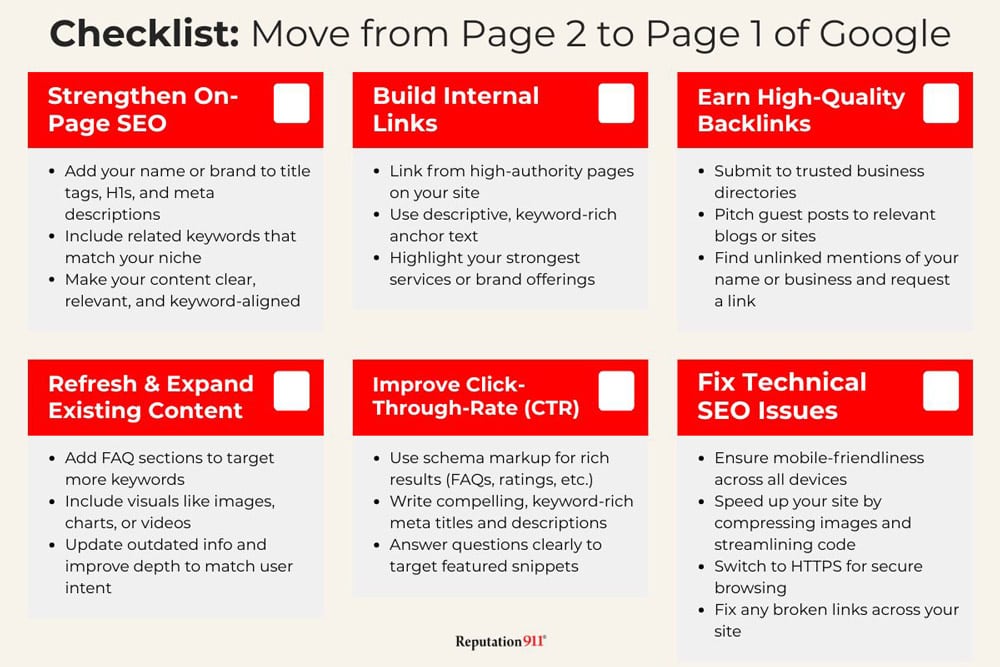
Some tactics might seem like shortcuts to higher rankings–but they can hurt your reputation and your chances of moving from page 2 to page 1.
Stick with ethical SEO practices and focus on high-quality, user-focused content. That’s the best way to move your positive, owned content to page 1 of Google.
Sometimes, no matter how hard you try, your content stays stuck on the second page of Google–or worse, negative results dominate page 1.
Here’s when it makes sense to get professional help:
Struggling with bad press or invisible content? Our content removal services can help you take control of your search results and protect your online reputation.
A higher CTR helps your positive, owned content perform better–and signals to Google that your page deserves a top spot.
To learn more about optimizing for featured snippets, check out our guides:
Together, proactive, maintenance, and reactive strategies form a complete reputation management plan–helping you build trust, stay prepared, and take control when it matters most.
Page 2 of Google is almost invisible to searchers. Don’t let your positive, owned content stay hidden—or let negative results define your reputation.
Here’s how to move from the second page of Google to page 1:
Taking these steps can help you protect your reputation and ensure that people find accurate information about you or your business.
Want more tips on how individuals can appear on the first page of Google? Check out our guide for individuals here.